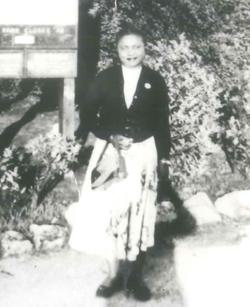Windrush Generation: Esme Lancaster MBE
ResourcesThis extract is from The Birmingham Black Oral History Project which was recorded in 1990s. The project was created to record the stories and lives of people from the Windrush Generation and people who came to Birmingham from South Asia.

Name: Esme Lancaster MBE
Born: Jamaica, 1st March 1917.
Education: Esme attended junior school in Jamaica. She talks about the difficulties she faced trying to attend secondary school, as her family would not pay the fees.
She eventually secured a scholarship to continue into higher education. Esme continued her education at college in England.
Job: Esme worked as a teacher on a ‘Sugar Estate’ in Jamaica. Later she trained as a social worker in England.
Oral History Interview: 1992 at the age of 75.
Interview overview:
Esme lived in Jamaica until 18th December 1950, when she travelled to England with the aim of improving her education. Though she was married at the time her husband did not join her until a few months later. Ultimately, she married twice and describes her marriages as the only regrets of her life.
Esme talks with great pride about her about ‘fourth grandfather’ who came to Jamaica as an enslaved African. Esme credits her great-grandfather with establishing her identity as a Black person.
“And he was fourteen years old when he came to Jamaica. His father was sold too; but he was sold for much more than his father because he was a very educated young man at that age.”
Esme settled in Handsworth, Birmingham, where her sister was already living. She was a Pentecostal Christian and describes how important her faith was to her. Esme had one adopted son and dedicated much of her life to helping children: though fostering, playgroups and community organisations. She considered this this work as her proudest achievement. She spent time living in Bristol, Birmingham and South America, returning to Jamaica on occasion.
Despite the difficulties Esme faced when emigrating to England, the cold, poor housing, homesickness and prejudices she experienced, she did not regret the decision,
“We’ve gained a lot of experience from it, from travelling, travelling alone is a school.”
Esme was proud of her identity as a Black person,
“I’m not a Black British, I am a Black person anywhere, if I am in Britain I am a Black person, in Jamaica I am a Black person born in Jamaica and anywhere in the world I am a Black person”
Esme's Full Interview:
You can listen and download Esme's full oral history on our City Sound Archive website: Listen to Esme's story.
Warning: These recordings include racially explicit content, including discussions of racism, prejudice and violence; racially explicit language; and language and phrasing that we would not use today. Some of this content might be unsuitable for younger listeners or triggering for People of Colour.
Windrush and The Birmingham Black Oral History Project
Find out more about this project on our Birmingham's Windrush Generation schools resource page.